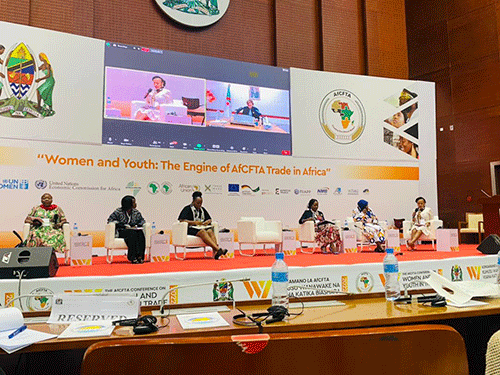A protocol for women and youth is needed to address practical trade-related issues and the persistent bottlenecks experienced by women and youth traders, both in formal and informal trade.
Trade deputy minister Verna Sinimbo made this observation at the African Continental Free Trade Area (AfCFTA) conference on women and youth in trade in Dar es Salaam, Tanzania recently.
“We are all aware of the many challenges facing our women and youth in trading on the continent, like lack of access to reliable trade intelligence, capital, investments, buyers’ connections and cumbersome customs processes,” she stated.
The AfCFTA is the world’s largest free trade area, bringing together the 55 countries of the African Union and eight Regional Economic Communities. The overall mandate of the AfCFTA is to create a single continental market with a population of about 1.3 billion people and a combined GDP of approximately US$3.4 trillion.
Sinimbo noted that the representation and participation of women and youth in trade governance to influence trade policy-making and implementation is missing, and should be thoroughly addressed.
Namibia is one of the countries that have submitted offers under the Trade in Services protocol, hence the need to champion initiatives that target women and youth participation in key services’ sectors such as logistics and tourism.
“We have also identified key sectors where women and youth are mostly concentrated such as agriculture, aquaculture, cosmetics and services, and target those for development at a national level. The ministry concluded the first-ever training in Standards with a focus on Good Manufacturing Practices that targeted more than 30 cosmetics companies at the beginning of September 2022,” she added.
Seven years ago, Namibia had less than 10 cosmetics companies. Today, there are more than 30, all women-owned and ready to trade on the continent to source ingredients/inputs or export.
Technical issues
Sinimbo said technical requirements such as labelling and packaging remain a challenge.
“For example, products found at informal markets are mostly products unique to the geographical environment, and could find niche markets on the continent. But the packaging and labelling are non-existent, and therefore are not trade-compliant.”
She observed that countries like Namibia are faced with overlapping trade rules, “and we need to simplify them to create a harmonised trade regime as trade documents are too technical, which makes many women traders shy away from investing in opportunities that unlock these preferences”.
“Women and youth can’t only focus on trade in goods, but also increase their participation in the trade in services agenda,” said Sinimbo.
– psiririka@nepc.com.na
Inclusion… The trade ministry took part in the AfCFTA conference on women and youth in trade in Dar es Salaam, Tanzania.



